Hey! I'm learning Japanese right now. いっしょにべんきょうしたいんですか。
Don't wanna be here? Send us removal request.
Video
youtube
YOASOBI 『ハルジオン 』 Halzion Lyrics
「ハルジオン」 /harujion/: Philadelphia fleabane
過ぎてゆく時間の中あなたを思い出す
sugite yuku toki no naka anata wo omoidasu (In the passage of time, I think of you)
物憂げに眺める画面に映った二人笑っていた
monouge ni nagameru gamen ni utsutta futari waratte ita (The two of us who are reflected on the screen, looking wearily, were laughing)
知りたくないほど知りすぎてくこと
shiritakunai hodo shiri sugite ku koto (The more I don’t want to know, the more I do)
ただ過ぎる日々に呑み込まれたの
tada sugiru hibi ni nomikomareta no (Was this just being swallowed by the days that had passed?)
それでもただもう一度だけ会いたくて
soredemo tada mōichido dake aitakute (Nevertheless, I still want to meet you one more time)
あなたの言葉に頷き信じた私を一人置き去りに時間は過ぎる
anata no kotoba ni unazuki shinjita watashi wo hitori okizari ni toki wa sugiru (The time in which I, who believed your words with a nod, was left alone, has passes)
見えていたはずの未来も指の隙間をすり抜けた
miete ita hazu no mirai mo yubi no sukima wo surinuketa (The future that I should have seen also slipped through the spaces between my fingers)
戻れない日々の欠片とあなたの気配を今でも探してしまうよ
modorenai hibi no kakera to anata no kehai wo ima demo sagashite shimau yo (Even now, I would end up searching for the fragments of the days to which I cannot go back and the signs of you)
まだあの日の二人に手を伸ばしてる
mada ano hi no futari ni te o nobashiteru (I’m still stretching my hands to the two of us of that day)
境界線は自分で引いた
kyōkaisen wa jibun de hiita (The boundary that I drew myself)
「現実は」って見ないフリをしていた
“genjitsu wa”tte minai furi wo shite ita (I was pretending that I didn’t see what “the reality is”)
そんな私じゃ見えない見えない
sonna watashi ja mienai mienai (That me cannot see it, cannot see it)
境界線の向こうに咲いた鮮烈な花達も本当は見えてたのに
kyōkaisen no mukō ni saita senretsuna hanatachi mo hontō wa mieteta no ni (Although the truth is that I could see the flowers that bloomed vividly on the other side of the boundary)
知らず知らずの内に擦り減らした心の扉に鍵をかけたの
shirazu shirazu no uchi ni suriherashita kokoro no tobira ni kagi wo kaketa no (On the inside of “I don’t know, I don’t know”, is the worn out door of the heart locked?)
そこにはただ美しさの無い私だけが残されていた
soko ni wa tada utsukushisa no nai watashi dake ga nokosarete ita (Only me, who was being left there with no beauty)
青過ぎる空に目の奥が染みた
ao sugiru sora ni me no oku ga shimita (The overly blue sky permeated into the depths of my eyes)
あの日の景色に取りに帰るの あなたが好きだと言ってくれた私を
ano hi no keshiki ni tori ni kaeru no anata ga sukida to itte kureta watashi wo (Are you going back to the scenery of that day to take me, the one who you said you liked?)
誰にも見せずにこの手で隠した想いが今も私の中で生きている
darenimo misezu ni kono te de kakushita omoi ga ima mo watashi no naka de ikite iru (The feelings that I hid with my hands, not showing to anyone, are still living within me now)
目を閉じてみれば今も鮮やかに蘇る景色と戻れない日々の欠片が映し出したのは蕾のまま閉じ込めた未来
me wo tojite mireba ima mo azayaka ni yomigaeru keshiki to modorenai hibi no kakera ga utsushidashita no wa tsubomi no mama tojikometa mirai
(If I try closing my eyes, the vividly revived scenery and the fragments of the days to which I cannot go back that projected even now, is the future that was trapped while it was still a bud)
もう一度描き出す
mōichido egakidasu (I will start drawing again)
あの日のあなたの言葉と美しい時間と二人で過ごしたあの景色が忘れてた想いと失くしたはずの未来を繋いでいく
ano hi no anata no kotoba to utsukushī toki to futari de sugoshita ano keshiki ga wasureteta omoi to nakushita hazu no mirai o tsunaide iku
(Your words of that day, the beautiful time and the scenery in which the two of us spent are the forgotten feelings connecting with the future that should have been lost)
戻れない日々の続きを歩いていくんだ
modorenai hibi no tsudzuki wo aruite ikunda (We will continue to walk on the days to which we cannot go back)
これからも、あなたがいなくても
korekara mo, anata ga inakute mo (From now on too, even when you are not here)
あの日の二人に手を振れば確かに動き出した未来へ
ano hi no futari ni te wo fureba tashika ni ugokidashita mirai he (if I swing my hand to that day of the two of us, I will probably head towards the future that started to move)
#ハルジオン#yoasobi#halzion#japanese song#japanese lyrics#romaji#english translation#i really love yoasobi#but this song is hard#like REALLY HARD
10 notes
·
View notes
Link
BTS 『Your eyes tell』 Lyrics
何故、こんなにも 涙が溢れるの
naze, konna ni mo namida ga afureru no (Why, the tears flow this much?)
ねえ、側にいて そして笑ってよ
nee, soba ni ite soshite waratte yo (Hey, stay by my side and laugh)
君のいない未来は 色のない世界
kimi no inai mirai wa iro no nai sekai (The future without you is a world without color)
モノクロで冷たい
monokuro de tsumetai (Monochrome and cold) 見つめてる 暗闇さえも So beautiful
mitsumeteru kurayami sae mo So beautiful (Even the darkness I’m staring at is so beautiful)
僕を信じてほしい
boku wo shinjite hoshii (I want you to trust me)
まっすぐに君だけを見て
massugu ni kimi dake wo mite (Only looking straight at you)
どこにも行かないように
doko ni mo ikanai you ni (So that you won’t go anywhere)
この先に何が待ち受けても
kono saki ni nani ga machiuketemo (Despite whatever awaits ahead)
遠くまで見つめるその向こう
tooku made mitsumeru sono mukou (Looking far away, beyond that)
君がくれた場所は今も
kimi ga kureta basho wa ima mo (The place you gave me is even now)
心の拠り所でいるのさ
kokoro no yoridokoro de iru no sa (Still in the foundation of my heart)
過去の影は何度も 追いかけてくるけれど
kako no kage wa nando mo oikakete kuru keredo (Shadows of the past chase after me many times but)
振り解くほどに がんじがらめで follow me
furihodoku hodo ni ganjigarame de Follow me (The more I shake them off, the more they stubbornly follow me)
それでも掴みたいんだ
sore demo tsukamitai-nda (Nevertheless, I still want to hold onto them)
何処へでも I’ll find you
doko e demo I’ll find you (No matter where, I’ll find you)
君と歩む明日へ
kimi to ayumu asu e (Walking into tomorrow with you)
終わりの始まりと なろうとしても
owari no hajimari to narou to shitemo (Even if it wants to become the beginning of the end)
君の名を叫ぶよ
kimi no na wo sakebu yo (I will (still) shout your name)
見つめてるその眼���しは So colorful
mitsumeteru sono manazashi wa So colorful (Staring at you, that look in your eyes is so colorful)
全てを捧げるよ
subete wo sasageru yo (I will give you everything)
叶わない、願いを胸に
kanawanai, negai wo mune ni (Unfulfilled, the wishes inside my chest)
言葉にできないまま
kotoba ni dekinai mama (Still cannot put into words)
過去と未来、向き合うために
kako to mirai, mukiau tame ni (In order to face the past and the future)
どれだけ望めば手が届く
dore dake nozomeba te ga todoku (How much I have to wish to reach your hand)
こんな夜だけど想い続けるよ
konna yoru dakedo omoi tsuzukeru yo (Even (on) night like this, I keep on thinking)
黄昏のこの街で
tasogare no kono machi de (In this city of twilight)
愛されたい ~ 愛せるよう
aisaretai ~ aiseru you (I want to be loved ~ I can love you)
瞳になるよ ~ これからの旅に
hitomi ni naru yo ~ kore kara no tabi ni (I will become your pupil ~ On the journey from now on)
見つめてる 暗闇さえも So beautiful
mitsumeteru kurayami sae mo So beautiful (Even the darkness I’m staring at is so beautiful)
僕を信じてほしい
boku wo shinjite hoshii (I want you to trust me)
まっすぐに君だけを見て
massugu ni kimi dake wo mite (Only looking straight at you)
どこにも行かないように
doko ni mo ikanai you ni (So that you won’t go anywhere)
見守ってる その眼差しは So colorful
mimamotteru sono manazashi wa So colorful (Watching over you, that look in your eyes is so colorful)
教えてくれたんだ
oshiete-kuretanda (You taught me)
いつの日かその悲しみは 僕らを紡いでいく
itsu no hi ka sono kanashimi wa bokura o tsumuideiku (Someday, that sadness is going to wind us together)
Ah-ah-ah Your eyes, they tell Ah-ah-ah-ah
#your eyes tell#bts#japanese song#japanese lyrics#romaji#english translation#it's my first time translating a bts song#i really tried#but it's probably 80% wrong lol#pls correct it for me#tysm
20 notes
·
View notes
Video
youtube
LiSA 『紅蓮華』 Gurenge Lyrics
「 紅蓮華 」 /gurenge/: Red lotus
強くなれる理由を知った
tsuyoku nareru riyū wo shitta (I knew the reason to become strong)
僕を連れて進め
boku wo tsurete susume (Take me along and move forward)
泥だらけの走馬灯に酔う
doro-darake no sōmatō ni you (Get drunk with muddy flashbacks)
こわばる心
kowabaru kokoro (Rigid heart)
震える手は掴みたいものがある
furueru te wa tsukamitai mono ga aru (Shaking hands mean there’s something I want to grab)
それだけさ
sore dake sa (That’s it all)
夜の匂いに (I’ll spend all thirty nights)
yoru no nioi ni (Upon the scent of the night)
空睨んでも (Staring into the sky)
sora niran demo (Even if I stare at the sky)
変わっていけるのは自分自身だけ
kawatte ikeru no wa jibun jishin dake (The one who can make a change is myself only)
それだけさ
sore dake sa (That’s it all)
強くなれる理由を知った
tsuyoku nareru riyū wo shitta (I knew the reason to become strong)
僕を連れて進め
boku wo tsurete susume (Take me along and move forward)
どうしたって!
dō shitatte (No matter what)
消せない夢も 止まれない今も
kesenai yume mo tomarenai ima mo (Despite the dreams that cannot be erased, despite the “now” that cannot be stopped)
誰かのために強くなれるなら
dareka no tame ni tsuyoku narerunara (If I can become strong for someone’s sake)
ありがとう 悲しみよ
arigatō kanashimi yo (Thank you, sadness)
世界に打ちのめされて負ける意味を知った
sekai ni uchinomesarete makeru imi wo shitta (Beaten up by the whole world, I knew the meaning of losing )
紅蓮の華よ咲き誇れ!
guren no hana yo sakihokore (The Red Lotus blooms)
運命を照らして
unmei wo terashite (Shining on the fate)
イナビカリの雑音が耳を刺す
inabikari no zatsuon ga mimi wo sasu (The noise of lightning pierces through my ears)
戸惑う心
tomadou kokoro (Lost heart)
優しいだけじゃ守れないものがある?
yasashī dake ja mamorenai mono ga aru? (Is there anything I can protect just by being kind?)
わかってるけど
wakatteru kedo (I know but)
水面下で絡まる善悪
suimenka de karamaru zen'aku (Beneath the water surface, good and bad are entangled)
���けて見える偽善に天罰 (Tell me why, tell me why, tell me why, tell me… I don’t need you!)
sukete mieru gizen ni tenbatsu (Divine punishment for the hypocrisy that can be seen clearly)
逸材の花より 挑み続け咲いた一輪が美しい
itsuzai no hana yori idomi tsudzuke saita ichirin ga utsukushī (The single flower that bloomed after endless challenges is even more beautiful that the “talented” flowers)
乱暴に敷き詰められた トゲだらけの道も
ranbō ni shikitsumerareta toge-darake no michi mo (The roads that were roughly spread with thorns as well)
本気の僕だけに現れるから 乗り越えてみせるよ
honki no boku dake ni arawareru kara norikoete miseru yo (Because it will appear only with the serious me, I will overcome everything and show it)
簡単に片付けられた 守れなかった夢も
kantan ni katadzukerareta mamorenakatta yume mo (The dreams that were easily put away and couldn’t be protected as well)
紅蓮の心臓に根を生やし この血に宿ってる
guren no shinzō ni ne wo hayashi kono chi ni yadotteru (The roots grow in the lotus’s heart, living in its blood)
人知れず儚い 散りゆく結末
hitoshirezu hakanai chiri yuku ketsumatsu (The ending that scatters briefly in secret)
無情に破れた 悲鳴の風吹く
mujō ni yabureta himei no kaze fuku (Heartlessly torn apart, the screaming wind blows)
誰かの笑う影 誰かの泣き声
dareka no warau kage, dareka no nakigoe (The shadow of someone laughing, the sound of someone crying)
誰もが幸せを願ってる
daremoga shiawase wo negatteru (Everyone is wishing for happiness)
どうしたって!
dō shitatte (No matter what)
消せない夢も 止まれない今も
kesenai yume mo tomarenai ima mo (Despite the dreams that cannot be erased, despite the “now” that cannot be stopped)
誰かのために強くなれるなら
dareka no tame ni tsuyoku narerunara (If I can become strong for someone’s sake)
ありがとう 悲しみよ
arigatō kanashimi yo (Thank you, sadness)
世界に打ちのめされて負ける意味を知った
sekai ni uchinomesarete makeru imi wo shitta (Beaten up by the whole world, I knew the meaning of losing )
紅蓮の華よ咲き誇れ!
guren no hana yo sakihokore (The Red Lotus blooms)
運命を照らして
unmei wo terashite (Shining on the fate)
#紅蓮華#gurenge#LiSA#鬼滅の刃#kimetsu no yaiba#japanese song#lyrics#japanese lyrics#romaji#english translation#I TRIED
4 notes
·
View notes
Photo
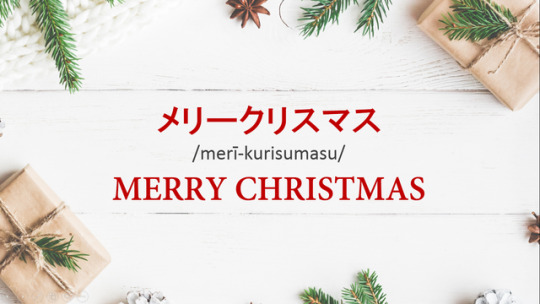
クリスマス /kurisumasu/: Christmas
サンタクロース /santa-kurōsu/: Santa Claus (another word is サンタのおじさん /santa-no-ojisan/)
エルフ /erufu/: Elf
プレゼント /purezento/: Present
そり /sori/: Sleigh
トナカイ /tonakai/: Reindeer
煙突 /entotsu/: Chimney
暖炉 /danro/: Fireplace
クリスマスキャロル /kurisumasu-kyaroru/: Christmas Carol
クリスマスツリー /kurisumasu-tsurī/: Christmas tree
リース /rīsu/: Wreath
ヒイラギ /hīragi/・ホリー /horī/ : Holly
ヤドリギ /yadorigi/: Mistletoe
クリスマスのあかり /kurisumasu-no-akari/: Christmas lights
オーナメント /ōnamento/: Ornament
蝋燭 /rōsoku/・ キャンドル /kyandoru/: Candle
鈴 /kane/・ベル /beru/: Bell
靴下 /kutsushita/: Socks / Stocking
雪だるま /yuki-daruma/: Snowman
スノーフレーク /sunōfurēku/: Snowflake
キャンディケイン /kyandī-kyan/: Candy cane
ジンジャーブレッドマン /jinjābureddo-man/: Gingerbread man
85 notes
·
View notes
Text
Ressun #8.7
~どれですか。
=> Which one ~?
Used when there are more than 2 objects.
The answer for this question must have「この/その/あの」at the begining.
例:
1.あなたのペンはどれですか。/anata no pen wa dore desu ka./ - Which one is your pen?
→ この赤いペンです。/kono akai pen desu./ - This red pen.
2.かのじょのかさはどれですか。/kanojo no kasa wa dore desu ka./ - Which one is her umbrella?
→ その白いかさです。/sono shiroi kasa desu./ - That white umbrella.
3.あたらしいえいがはどれですか。/atarashī eiga wa dore desu ka./ - Which one is the new movie?
→ あのえいがです。/ano eiga desu./ - That movie.
26 notes
·
View notes
Photo
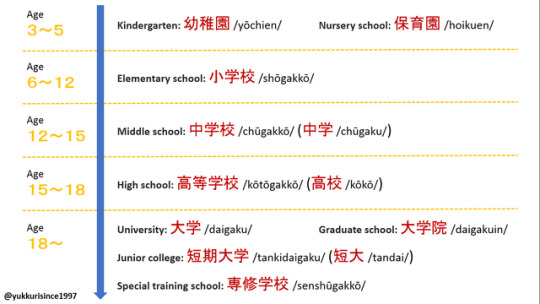
Japanese School System
#japanese#nihongo#vocab#school#kindergarten#nursery school#elementary school#middle school#high school#university#graduate school#junior college#special training school
37 notes
·
View notes
Text
Ressun #8.6
Aい/ Aな N を/に/へ V。
=> to describe the action you are doing or have already done.
例:
1.毎朝、あついコーヒーを飲みました。/mai-asa, atsui kōhī o nomimashita./ - Every morning, I drink hot coffee.
2.ハンサムな人に会いました。/hansamu na hito ni aimashita./ - I met a handsome person!
3.昨日、どんなところへ行きましたか。/kinō, don'na tokoro e ikimashita ka./ - Yesterday, what kind of place did you go to?
→ しずかなところへ行きました。/shizuka na tokoro e ikimashita./ - I went to a quiet place.
26 notes
·
View notes
Photo
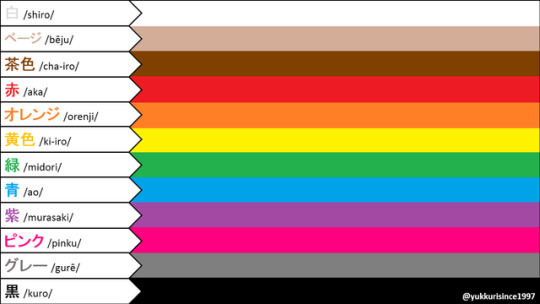
色 /iro/: Color
Japanese colors have two forms: adjective form and noun form.
The photo above shows the noun form of colors. If you want to turn them into adjectives, there are few rules you need to remember:
Adding「い」/i/ after the noun form to turn it into i-adjective ( Aい + N ).
例:白い /shiroi/、赤い /akai/、青い /aoi/、黒い /kuroi/
Adding「の」/no/ after the noun form in order to connect it with the following noun ( N-color の N ).
例: ベージュの /bēju no/、オレンジの /orenji no/、緑の /midori no/、紫の /murasaki no/、ピンクの /pinku no/、グレーの /gurē no/
「茶色」/cha-iro/ and「黄色」/ki-iro/ can be turned into adjectives either way.
92 notes
·
View notes
Text
Ressun #8.5
N1 はどんな N2 ですか。
=> What kind of N2 am/is/are N1?
「どんな」/donna/: What/ What kind of
N1 は Aい/ Aな N2 です。
=> N1 am/is/are A N2.
*If a Na-adj (A「な」) is standing before a noun: A「な」+ な + N
例:
1.かのじょはどんなおんなですか。きれいなおんなですか。やさしいですか。/kanojo wa don'na on'na desu ka. kirei na on’na desu ka. yasashī desu ka./ - What kind of girl is she? Is she a pretty girl? Is she kind?
→ きれいなおんなですが、やさしくないです。/kirei na on’na desu ga, yasashikunai desu./ - She is a pretty girl but she is not kind.
2.「となりのトトロ」はどんなえいがですか。/tonari no totoro wa don’na eiga desu ka./ - What kind of movie is “My Neighbor Totoro“?
→ ほんとうにかわいいえいがです。/hontōni kawaī eiga desu./ - A really cute movie.
15 notes
·
View notes
Text
Visiting Someone's Home in Japanese
ホセ:ごめんください。/gomenkudasai./
山田 /yamada/:いらっしゃい。どうぞお上がりください。/irasshai. dōzo oagari kudasai./
ホセ:失礼します。/shitsureishimasu./
。。。
山田:コーヒーはいかがですか。/kōhī wa ikaga desu ka./
ホセ:ありがとうございます。/arigatō gozaimasu./
「ごめんください」/gomenkudasai/: literally means "Please forgive me for bothering you." (often used by guests when visiting someone's home)
「いらっしゃい」/irasshai/: “Welcome” (should not be used when a guest is superior to a host)
「どうぞお上がりください」/dōzo oagari kudasai/: “Please come in”
「失礼します」/shitsureishimasu/: literally means, "I'm going to be rude" (when entering someone's house or room, it means "Excuse my interrupting"; when leaving it’s used as "Excuse my leaving" or "Good-bye")
「~はいかがですか」/~wa ikaga desu ka./: “Would you like some~?”
ノート:
1. 上 : above, up
音:ジョウ /jō/、ショウ /shō/
訓:うえ /ue/、うわ /uwa/、かみ /kami/、あげる /ageru/、あがる /agaru/、のぼる /noboru/、のぼせる /noboseru/、のぼす /nobosu/
2. 山 : mountain
音:サン /san/
訓:やま /yama/
3. 田 : rice paddy, rice field
音:デン /den/
訓:た /ta/
4. 失 : loss, error, fault, disadvantage
音:シツ /shitsu/
訓:うしなう /ushinau/
5. 礼 : thanks, salute, bow, ceremony
音:レイ /rei/、ライ /rai/
31 notes
·
View notes
Text
Ressun #8.4
~が、~。
「が」/ga/: But
~。そして、~
「そして」/soshite/: And
例:
1.いなかはしずかですが、べんりじゃありません。/inaka wa shizuka desu ga, benri ja arimasen./ - The country is quiet but it isn’t convenient.
2.てがみをかきましたが、おくりませんでした。/tegami o kakimashita ga, okurimasendeshita./ - I wrote a letter but I didn’t send it.
3.母はきれいです。そして、やさしいです。/haha wa kirei desu. soshite, yasashī desu./ - My mother is beautiful. And, she is kind.
4.しゅくだいをしました。そして、あたらしいことばをべんきょうしました。/shukudai o shimashita. soshite, atarashī kotoba o benkyōshimashita./ - I did (my) homework. And, I studied new words.
19 notes
·
View notes
Photo
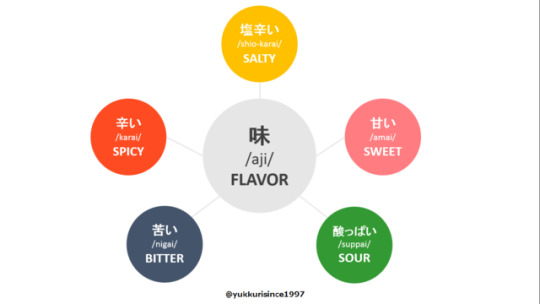
Flavors in Japanese
38 notes
·
View notes
Text
Ressun #8.3
N はどうですか。
=> How am/is/are N?
「どう」/dō/: How/ In what way
例:
1.日本語はどうですか。/nihongo wa dou desu ka./ - How is Japanese?
→ 日本語はとてもむずかしいです。/nihongo wa totemo muzukashii desu./ - Japanese is very hard.
2.そのすしはどうですか。/sono sushi wa dou desu ka./ - How is that sushi?
→ あまりおいしくないです。/amari oishikunai desu./ - It is not very tasty.
*「とても」/totemo/: Very
- Used in affirmative sentences.
- Only used with adjectives.
*「あまり~ません」/amari~masen/: Not very/ Not much
- Used in negative sentences.
- Used with both verbs and adjectives:
あまりVません
あまりA「な」じゃありません
あまりAいくないです
34 notes
·
View notes
Photo
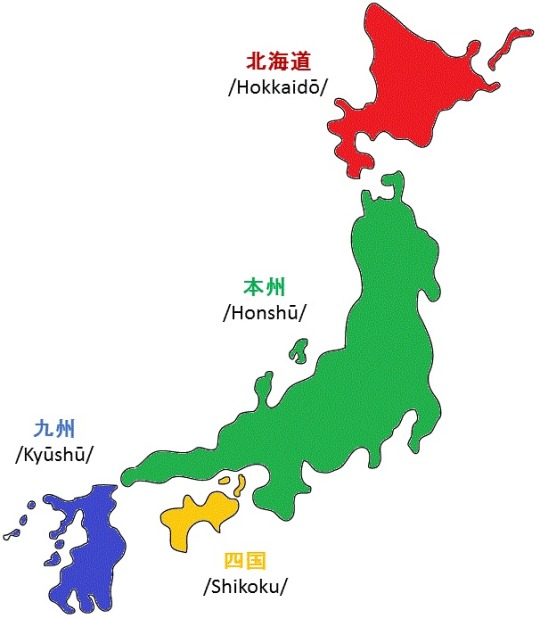
Four Main Islands of Japan
島 /shima/: Island
143 notes
·
View notes
Text
Ressun #8.2
*Aい
Affirmative
- Non-past:
Aいです
例:おいしいです。/oishii desu./ - It is tasty.
- Past:
Aいかったです
例:おいしかったです。/oishikatta desu./ - It was tasty.
Negative
- Non-past:
Aいくないです
例:おいしくないです。/oishikunai desu./ - It isn’t tasty.
- Past:
Aいくなかったです
例:おいしくなかったです。/oishikunakatta desu./ - It wasn’t tasty.
*Special case: 「いい」/ii/ →「よい」/yoi/ - good
いいです → よかったです
よくないです → よくなかったです
*A「な」/ N
Affirmative
- Non-past:
A「な」/ N です
例:きれいです。/kirei desu./ - It’s pretty.
本です。/hon desu./ - It’s a book.
- Past:
A「な」/ N でした
例:きれいでした。/kirei deshita./ - It was pretty.
本でした。/hon deshita./ - It was a book.
Negative
- Non-past:
A「な」/ N じゃありません
例:きれいじゃありません。/kirei ja arimasen./ - It isn’t pretty.
本じゃありません。/hon ja arimasen./ - It isn’t a book.
- Past:
A「な」/ N じゃありませんでした
例:きれいじゃありませんでした。/kirei ja arimasendeshita./ - It wasn’t pretty.
本じゃありませんでした。/hon ja arimasendeshita./ - It wasn’t a book.
10 notes
·
View notes
Text
Opposite Adjectives in Japanese
おおきい /ōkī/ - big # ちいさい /chīsai/ - small
ながい /nagai/ - long # みじかい /mijikai/ - short
*たかい /takai/ - high # ひくい /hikui/ - low
*たかい /takai/ - expensive # やすい /yasui/ - cheap
あたらしい /atarashī/ - new # ふるい /furui/ - old
むずかしい /muzukashī/ - hard, difficult # やさしい /yasashī/ - easy
いい /ī/ (よい /yoi/) - good # わるい /warui/ - bad
きれい「な」/kirei/ - beautiful, clean # きたない /kitanai/ - dirty
ちかい /chikai/ - near # とおい /tōi/ - far
はやい /hayai/ - fast, early # おそい /osoi/ - slow, late
うるさい /urusai/ - noisy # しずか「な」/shizuka/ - quiet
おいしい /oishī/ - delicious # まずい /mazui/ - bad
おもしろい /omoshiroi/ - interesting # つまらない /tsumaranai/ - boring
べんり「な」/benri/ - convenient, useful # ふべん「な」/fuben/ - inconvenient
*あたまがいい /atama ga ī/ - smart # あたまがわるい /atama ga warui/ - stupid
*せがたかい /se ga takai/ - tall # せがひくい /se ga hikui/ - short
59 notes
·
View notes
Text
Ressun #8.1
There are 2 types of adjectives in Japanese: Aい (i-adj) and A「な」(na-adj).
Aい
the “i” sound stands after words that have “a/i/u/o” sound.
例:
- たかい /takai/ - high
- おいしい /oishī/ - delicious
- ひくい /hikui/ - low
- おもしろい /omoshiroi/ - interesting
A「な」
na-adjs don’t end with “i” sound.
例:
- しずか「な」 /shizuka(na)/ - quiet
- げんき「な」 /genki(na)/ - healthy
words that have “i” sound come after “e” sound are na-adjs.
例:
- きれい「な」/kirei(na)/ - beautiful/clean
- ゆうめい「な」/yūmei(na)/ - famous
*Special case: きらい「な」/kirai(na)/ - hated/disliked
15 notes
·
View notes